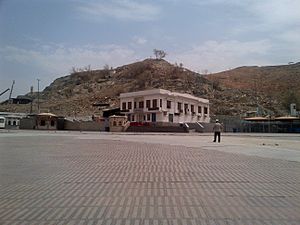Aminah facts for kids
Quick facts for kids
Aminah bint Wahb
آمِنَة بِنْتُ وَهْب |
|
|---|---|
| Born |
ʾĀaminahʾ bint Wahb
549 C.E. / 66 B.H. |
| Died | 576–577 C.E. / 36 B.H. (Age 27) Al-Abwa', Tihamah, Hejaz (present-day KSA)
|
| Resting place | Al-Abwa |
| Known for | Mother of Muhammad |
| Spouse(s) | Abdullah ibn Abd al-Muttalib (m. 568–569) |
| Children | Muhammad |
| Parents |
|
| Relatives |
Cousin:
Daughter(s)-in-law:
Granddaughter(s):
Grandson(s):
|
| Family | Banu Zuhrah (of Quraysh) |
Aminah bint Wahb was a very important woman in history. She was the mother of the Islamic prophet Muhammad. Aminah belonged to the Banu Zuhrah clan, which was part of the powerful Quraysh tribe in Mecca. She lived from about 549 CE to 577 CE.
Early Life and Marriage
Aminah was born in Mecca, a city in what is now Saudi Arabia. Her father was Wahb ibn Abd Manaf and her mother was Barrah bint Abd al-Uzza. Her tribe, the Quraysh, believed they were descendants of the prophet Abraham (called Ibrahim in Islam). They traced their family line through Abraham's son Ishmael (Isma'il).
Aminah's ancestor, Zuhrah, was the older brother of Qusai ibn Kilab. Qusai was an important leader. He was the first person from the Quraysh tribe to take care of the Kaaba. The Kaaba is a very holy building in Mecca.
Later, Abd al-Muttalib, a respected elder, suggested that his youngest son, Abdullah ibn Abd al-Muttalib, marry Aminah. Some stories say Aminah's father agreed to the marriage. Other stories say her uncle, Wuhaib, who was her guardian, agreed. Aminah and Abdullah were married soon after.
Abdullah was a merchant. He traveled a lot for his business. During Aminah's pregnancy, Abdullah was away with a trading group. Sadly, he became sick and died before his son was born.
Birth of Muhammad and Later Years
Three months after Abdullah's death, in 570 or 571 CE, Muhammad was born. It was a common tradition for important families back then to send their babies to live with a "milk mother" in the Arabian Desert. People believed that living in the desert would help children learn self-discipline and become strong.
During this time, a kind Bedouin woman named Halimah bint Abi Dhuayb nursed Muhammad. She was from the Banu Sa'ad tribe.
When Muhammad was six years old, he came back to live with Aminah. She took him to visit her relatives in Yathrib, a city later known as Medina. After about a month, they started their journey back to Mecca. Aminah was with her slave, Umm Ayman.
On the way back, Aminah became very ill. She passed away around the year 577 or 578 CE. She was buried in a village called Al-Abwa'. Her grave was later destroyed in 1998. After Aminah's death, young Muhammad was first cared for by his grandfather, Abd al-Muttalib. Later, his paternal uncle, Abu Talib, took him in.
See also
 In Spanish: Amina bint Wahb para niños
In Spanish: Amina bint Wahb para niños
Images for kids



